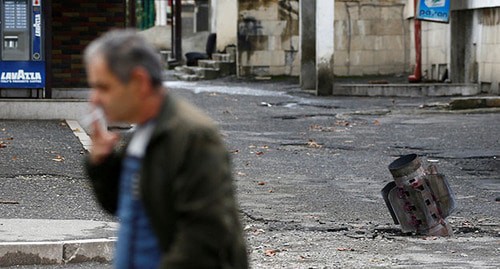
14 November 2020, 13:12
Stepanakert townspeople announce plans to return home
Almost a third of Stepanakert residents who had left for Armenia during the conflict aggravation have returned back, David Sargsyan, the city Mayor, has informed. The refugees themselves said that they had temporarily settled in Yerevan, but were going to return home.
The "Caucasian Knot" has reported that Russian peacemakers, following the concluded tripartite agreement on ceasefire in the conflict zone, have taken control over the Lachin corridor connecting Karabakh with Armenia, by setting up temporary posts there. On November 12, the peacemaking battalion of the Russian Ministry of Defence (MoD) took control of Stepanakert; 10 observation posts were set up along the contact line.
On November 10, an agreement between Russia, Azerbaijan, and Armenia on the cessation of the hostilities in Nagorno-Karabakh came into force. According to the agreement, Azerbaijan takes over the territories of Nagorno-Karabakh captured during the hostilities and gets the so-called "Security Belt", that is, returns the territories of five districts adjacent to Karabakh.
Residents of Stepanakert are returning home; over 30% of townspeople who had left the city because of the conflict aggravation have already returned, Mayor David Sargsyan told the "Caucasian Knot" correspondent.
According to his story, the city is by 60% supplied with electricity; and gas supply has resumed.
The Mayor has added that the city dwellers who had lost their homes as a result of shelling will be provided with temporary housing by the Mayoralty.
Liana Arutyunyan, a resident of Stepanakert, told the "Caucasian Knot" that she had worked as a seamstress at the local military hospital; and the entire team remained at work there since the start of the autumn war.
"We slept in the basement. On October 23, my son was wounded. And I together with him in an ambulance came to Yerevan, to the hospital, where my son was operated on," she said, noting that she would definitely return to Stepanakert as soon as her son recovers.
Rubina Kamalyan, a first-year student at the Artsakh State University, also told the "Caucasian Knot" that she would return to Stepanakert, when her father tells her that it is safe to return to the city.
According to her story, in Armenia she and her sister first lived with their relatives in Ashtarak. "We now live in one inoperative restaurant, where the owner thereof has provided rooms for three families," she has added.
This article was originally published on the Russian page of 24/7 Internet agency ‘Caucasian Knot’ on November 14, 2020 at 06:52 am MSK. To access the full text of the article, click here.
Author: Tigran Petrosyan Source: CK correspondent




